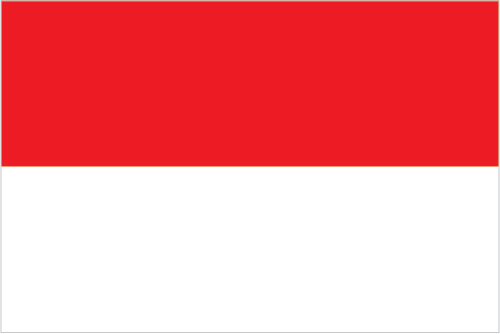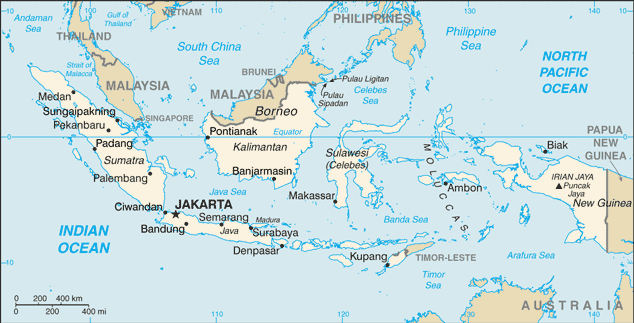Exporting to Indonesia


Indonesia Country Profile
Official Name (Local Language) Republik Indonesia
Capital Jakarta
Population 258,316,051
Currency Indonesian Rupiah
GDP $941 billion
Languages Bahasa Indonesia
Phone Dial In 62
Indonesia Imports Profile
Imports ($m USD) 157,388
Number of Import Products 4,413
Number of Import Partners 222

Indonesia Economic Statistics
Government Website | https://indonesia.go.id/ |
| Sovereign Ratings | https://countryeconomy.com/ratings/indonesia |
| Central Bank | Bank Indonesia |
| Currency USD Exchange Rate | 13,483 |
| Unemployment Rate | 5.6% |
| Population below poverty line | 10.9% |
| Inflation Rate | 3% |
| Prime Lending Rate | 6.37% |
| GDP | $941 billion |
| GDP Pro Capita (PPP) | $11,700 |
| Currency Name | Indonesian Rupiah |
| Currency Code | IDR |
| World Bank Classification | Lower Middle Income |
| Competitive Industrial Performance | 41/138 |
| Corruption Perceptions Index | 96/180 |
| Ease of Doing Business | 73/190 |
| Enabling Trade Index | 70/136 |
Access trade, receivables and supply chain finance
We assist companies to access trade and receivables finance through our relationships with 270+ banks, funds and alternative finance houses.
Get StartedExporting to Indonesia
Through the building of an extensive free trade network with more than 40 countries, Mexico has risen to the status of the second largest economy in Latin America. Currently ranked as the world’s fifteenth largest economy it is tipped by World Bank analysts to rise to fifth by 2050.
Mexico’s imports are about $355 billion per annum with major imports being refined petroleum ($23.8 billion), vehicle parts ($20 billion), integrated circuits ($11 billion) and computers ($9.6 billion). Major import partners are the United States ($180 billion), China ($56 billion) and Japan ($14 billion).
Exporting to Indonesia: What is trade finance?
Export finance is a revolving facility which alternative financiers offer – it enables SMEs to buy products and can help ease cash management.
Often, a trade financier will fund up to 100% of the cost of the receivables, including charges (e.g. delivery costs).
Trade finance offers added advantages over more traditional bank finance including asset finance or business loans. Trade finance provides up front funding without affecting existing bank relationships.
How does it work?
If you’re a firm importing or exporting stock around the world, then a trade finance facility would help you to fund this through offering a letter of credit or some form of cash advance.
I’m looking to export to Mexico, how can Trade Finance Global help, and how does it work?
If you are looking to export products to other countries, you may need export finance, which is a commercial agreement between you (the exporter), and the importer. A trade finance bank would advance you the cost of producing the products that you are exporting (as a debt product), either once you have shipped the goods, or before producing them. Once the importer has received the stock and pays you for the import, you will repay the advance from the export bank over an agreed period.
Chart Showing GDP Growth Compared to rest of world
GDP Composition for Indonesia
Agriculture
13.7%
Rubber and similar products, palm oil, poultry, beef, forest products, shrimp, cocoa, coffee, medicinal herbs, essential oil, fish and its similar products, and spices
Industry
40.3%
Petroleum and natural gas, textiles, automotive, electrical appliances, apparel, footwear, mining, cement, medical instruments and appliances, handicrafts, chemical fertilizers, plywood, rubber, processed food, jewelry, and tourism
Services
46%
Map
Top 5 Import Partners
| Country | Trade | % Partner Share |
| China | 34,521 | 21.93 |
| Singapore | 16,992 | 10.80 |
| Japan | 14,134 | 8.98 |
| Malaysia | 9,059 | 5.76 |
| Thailand | 9,036 | 5.74 |
Top 5 Import Products
| Export Product | Number |
| Petroleum oils, etc, (excl. crude); preparation | 9.5% |
| Petroleum oils and oils obtained from bituminou | 5.2% |
| Spelt, common wheat and meslin | 2.3% |
| Parts of electrical apparatus for line telephon | 2.1% |
| Raw cane sugar, in solid form | 1.8% |
Local Partners
- All Topics
- Indonesia Trade Resources
- Export Finance & ECA Topics
- Local Conferences



















